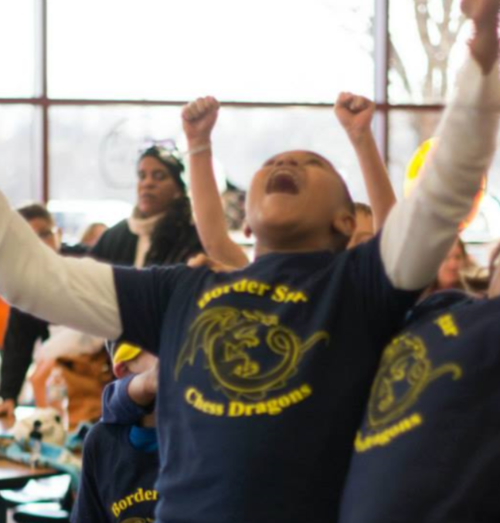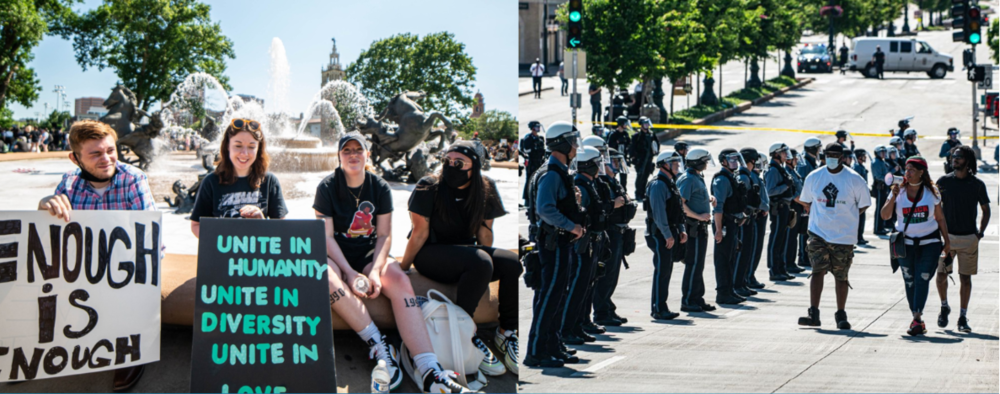Marvin Francois: Scenes From a Life Lived For Others Community Mourns Man Killed During KC's George Floyd Protests
Published June 5th, 2020 at 6:00 PM
Above image credit: Marvin Francois with his Jeep Wrangler. (Courtesy | Francois family)The moment is captured forever: A child — Marvin Francois’ child — photographed in full joy.
This is not by chance. It’s not luck that Francois was there, snapping his lens right when the team champion of a LINC chess tournament was announced.

You see his son, then an elementary student at Border Star Montessori School in Kansas City, exulting with his arms high, his teammates’ raised fists behind him, his face raised to the ceiling in a child’s soaring cry.
Of course it was Francois whose camera found the sensitive and poignant moments in the lives of those around him.
For the same reason he will be remembered for being the mentor that his four children needed, and their friends, and new friends he met along the way — right when they needed it.
For the same reason he’ll be remembered as the man in his treasured Jeep, pulling neighbors’ and strangers’ cars out of snowbanks. Or the dad helping set up tables for LINC programs and school programs.
On the day he died, May 31, he had been out on the Country Club Plaza, of course, ranging through the crowds in the uprising for civil and criminal justice, marveling in the wild and diverse energy of the demonstrators, capturing his last photo album.
He was shot dead that night at the age of 50, just a few blocks from the demonstrations, the victim of an apparent attempted robbery — Kansas City’s 73rd homicide of 2020.
He was close to the action, close to the heart of his community as always.
Because whether in the role of husband, father, mentor, volunteer, or photographer, “Marvin was always there,” said LINC Caring Communities Site Coordinator Adrian Wilson,
“The one face you knew you’d see,” Wilson said. “The rock” in so many people’s lives. Lost, he said, to “senseless violence.”
‘He was everything for us’
Francois’ camera led first wherever he went, like the nose of a camel, so that’s how LINC chess director Ken Lingelbach first knew him, but then everything else about him soon followed.
“He was a great photographer, but the ultimate thing, he was a great father,” Lingelbach said. “You could see the love and care for his kids.”
Two of his children, Jayden, now 18, and Diamond, 14, started at Border Star and have been LINC chess players through high school. Christi Francois, who was married to Marvin for 17 years, is their mother. He had two more children, Cheyenne, 20, and Brandon, 18.

Cheyenne recently completed an associate’s degree, and Brandon and Jayden just graduated high school. And their father captured that achievement as a photographer would, posing the four of them in a photo shoot at Loose Park’s rose garden.
“He was everything for us,” Christi Francois said of her husband. He had the “wow factor.”
He made his living as a graphic designer and then a software engineer. But at any moment he was a creator, she said, an innovator, a fixer — like the time when the air conditioner was out and the repairman was still hours away on a sweltering day and he rigged up an industrial fan to send air through the A/C.
An elderly neighbor had trouble keeping her yard up, so Francois had been mowing it for her. He deliberately took his black Jeep Wrangler out into the snow and ice because he wanted to find stuck cars and pull them out.
He not only was close with his children and meeting their comforts and needs, but with their friends.
“He loved life, he really did,” Christi said. “He loved life and he loved people.”
‘Oh my God, not again’
What’s the angle? Where’s the light coming from? What’s the moment you’re trying to catch?
Francois was always asking the fellow photographers he met at LINC.
He was quite a perfectionist who loved to talk photography — and chess, said Lee Bohannon, a community organizer at LINC and founder of the chess program.
“He had a sensitivity to the kids’ welfare,” he said.
Francois really understood the children through his lens, and then as a father figure, sitting and walking among them to talk strategy and philosophy.
“He could see when a young person embraced chess that there were things that went on in their head that rewired their thinking,” Bohannon said. “(He saw that) they become empathetic with the people around them and are helpful to one another.”
“Marvin,” Bohannon said, “always made it cool. He was the calming guy…”
Which makes what happened that final night near the Plaza so hard to believe.
As an organizer, advocate and activist since the Civil Rights Era, Bohannon carries a long, intimate — and firsthand — experience of the violence suffered by black men. Then came the news of Francois’s death, churned through the surreal mix of the pandemic and the protests across the city.
“My first thought,” Bohannon said, “was, oh my God, not again.”
Bohannon retraced his work, LINC’s work in the face of inequities in health care, education, housing, and how Francois became a part of it.
“When I think of Marvin and what happened to him,” he said, “there is a wound in our community that needs salving.”
Marvin Francois leaves his mark on the people who knew him to take up the healing. And he leaves his art, his photography: Images of children growing and achieving. Portraits of justice. Images of a unifying, diverse revolution in his city — hot for change.



